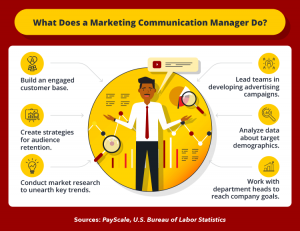Strategic Organizational Communication
Overview
Strengthen the Inner Voice of Your Organization
Communication and business efficiency have one thing in common: both work best when tied to strategy. By focusing your MCM in strategic and organizational communication, you can learn the critical assessment models, social contexts and risk mitigation tactics necessary to solve organizational problems — and enhance communication functions for organizations across industries.
Program Details
100%
reported employment rate upon graduation
94%
received a raise, promotion or new title after completing the program
89%
appreciated the personal satisfaction of earning a degree
83%
said it helped expand knowledge of the industry
Who Can Benefit from the MCM Strategic Organizational Communication Focus Area?
Expertise areas for MCM graduates include:
- Human resource management
- Corporate communication
- Strategic planning
- Operations management
- Communication consulting
- Other general management functions
Where can you work with an MCM degree?
- Corporations
- Marketing and communication organizations
- Professional, scientific and technical firms
- Colleges and universities
- Finance and insurance groups
- Health care organizations
- Local, state and federal government departments
Benefit from the USC Annenberg Experience
When you become an online MCM student, you are granted access to the renowned USC Annenberg School for Communication and Journalism and its resources. That means all of our digital libraries, professional networks and accomplished faculty are available to develop your strategic communication expertise and build your confidence to put it into action.
Broaden your skill set with professional growth opportunities:
- Access a multitude of creative workshops, digital tools and events through the USC Annenberg Digital Lounge, an official Adobe Certification Center
- Learn from a world-class faculty of leading experts in marketing, new and social media, change management, research and corporate communication
- Solve real-world problems with experiential learning opportunities
- Engage with diverse, multidisciplinary professionals across industries
- Connect with more than 15,000 USC Annenberg alumni worldwide
Master’s in Communication Management Careers
Organizational Communication Careers
According to the U.S. Bureau of Labor Statistics, the overall employment of media and communication occupations is projected to grow 4% from 2018 to 2028 — and is a direct result of organizations integrating their multigenerational, multicultural workforces with digital platforms.
MCM strategic and corporate communications graduates have parlayed their degree into key roles at various professional levels.
Develop and implement strategic messaging of organizational initiatives and projects, then successfully communicate those objectives to employees and organizational stakeholders on a consistent basis. This role typically works with a variety of mediums, such as a staff intranet, monthly magazine or regular email bulletin.
Median salary: $78,533
Top earners: $119,000+ (with more than nine years of experience)
Expected growth: 10% from 2016-2026
Propose ways to improve an organization’s efficiency by information gathering, conducting interviews with key personnel, analyzing financial data and making recommendations to managers on how to reduce costs and increase revenues.
Median salary: $83,610
Expected growth: 14% from 2018-2028
Plan and direct public relations programs that create a positive public image for an organization or business. This role also oversees press releases and communications with media, works with advertising and marketing staff to target advertising campaigns and manages internal communications.
Median salary: $75,700 (with a master’s degree)
Top earners: $96,000+
Expected growth: 10% from 2016-2026
Provide strategic leadership of the communications and marketing department for a business or organization, which includes implementation of strategic plans, approval of marketing programs, and direction of internal and external communications.
Median salary: $84,800
Top earners: $105,000+ (with a master’s degree)
Expected growth: 10% from 2016-2026
Develop or refine communications and brand strategy for a company or organization. This role also oversees the marketing activities with a focus on maintaining positive brand awareness, building and retaining a strong customer base, analyzing business competition and supervising marketing communication staff.
Median salary: $72,850
Top earners: $107,000+ (with more than nine years of experience)
Expected growth: 10% from 2016-2026
Communication Management Career Opportunities






- Brown and Caldwell
- Canon Solutions America
- Centers for Disease Control and Prevention
- The City of Las Vegas
- DISYS
- General Electric
- GP Strategies
- Integrity Public Relations, Inc.
- Kaiser Permanente
- Keurig Green Mountain
- Merck
- Outfront Media
- Roots of Peace
- Signet Maritime Corporation
- State Farm
- Teacher Created Materials
- Tesoro Refining and Marketing
- The University of Southern California
- WSS
- YWCA
Communication Manager Graduate Salary Range
$100k+
33% of grads
$76k - $100k
26% of grads
$51k - $75k
40% of grads
$0 - $50k
2% of grads
6 Career Opportunities in the Field of Communication
Analyst
Job Description and Salary
Analysts in communication roles perform research that helps organizations better understand their consumers and employees. When focused on consumer research, analysts collect and interpret data about customer satisfaction and sales trends. They also examine consumer buying habits and preferences, making use of public opinion polls, focus groups and interviews. This allows them to uncover insights that improve sales and marketing strategies, as well as strengthen product development tactics. Some analysts focus on employee insights, gathering feedback and survey data to help company leaders make data-driven decisions regarding employee hiring, training and management. Analysts may design processes for collecting and conducting research, in addition to creating and delivering reports to stakeholders. According to the BLS, insight analysts earned a median annual salary of $65,810 in May 2020.
Administrator
Job Description and Salary
Communication administrators help implement and monitor an organization’s communication strategies — the communication tactics used to support an organization’s business objectives. Communication administrators create marketing materials, including press releases, newsletters and social media posts, and contribute to their organizations’ websites. They also track the success of communication campaigns and help plan promotional events, press conferences and meetings to improve the image and brand of an organization. The BLS reports that public relations specialists, whose job duties align closely with those of communication administrators, earned a median annual income of $62,810 in May 2020.
C-Suite Positions
Job Description and Salary
Top executives in communications may be referred to as chief communication officers, or they may have executive titles with the phrases public relations or internal and external communications attached. These organizational leaders communicate a company’s business strategy across many audiences, including investors, employees, the public and the media. This role involves handling corporate communications, internal communications and reputation management. It also entails consulting with and serving as a strategic adviser to other organizational leaders about transparent and consistent messaging. Overall, communication C-suite positions have the responsibility of making sure their departments leverage digital communications and other innovative forms of communication to advance their organizations’ performance. The BLS reports that top communication executives earned a median annual income of $185,950 in May 2020.
Supervisor/Manager
Job Description and Salary
Communication managers handle the internal and external communication of organizations. This involves organizing and overseeing the design and content of marketing materials and devising communication strategies that grow brand awareness and customer loyalty programs. It also involves preparing media activity reports and generating fresh ideas with marketing departments to promote a company's services and products. Communication managers often collaborate with writers, designers and marketers. They earned a median annual salary of about $66,000 as of June 2021, according to PayScale.
Vice President
Job Description and Salary
A vice president of communications develops an organization’s communication strategy and contributes to its strategic planning process. Communication professionals in these executive positions oversee the communication activities that build and promote an organization’s reputation. They also develop and implement various public relations activities geared toward advancing an organization’s strategy and positioning goals. Additionally, a vice president of communications is responsible for ensuring communication materials align with an organization’s placement and brand. This often involves designing rules and guidelines about messaging for organization employees. According to PayScale, as of May 2021, vice presidents of communications earned a median annual income of about $149,500.
Director
Job Description and Salary
As organizational leaders, communication directors manage outreach strategy and ensure unified and compelling messaging. They oversee the communications and public relations staff, making sure the internal and external materials produced speak to a company’s values and vision, both clearly and accurately. This involves reviewing and approving marketing materials such as press releases, as well as communications such as internal memos. Communication directors may advise top executives on effective strategies for communicating an organization’s brand, and they may also train employees on how to speak to the media. Additionally, communication directors often serve as the spokespeople for their organizations. Communication directors earned a median annual income of around $84,000 as of June 2021, according to PayScale.
Communication Management Skills You Should Know
Modern Media Skills
Today’s fast-evolving digital world has changed how and where people communicate. It has shifted consumers’ expectations and influenced the ways employees interact with their employers. To keep up, communication professionals must have a firm grasp of tech alongside sharp digital and social media skills. This means knowing how to leverage the potential of social media platforms, ranging from Reddit and LinkedIn to Instagram and Facebook, and becoming knowledgeable about which strategies work best on each one. It also means putting digital tools to work, whether they be emerging software or online platforms such as Google Analytics.
Successful communication professionals know how to choose the channels and marketing tools that best deliver a brand’s message. They also have the media skills that allow them to create the personalization consumers have come to expect. Our online Master of Communication Management courses teach students to effectively maneuver online marketing, new media technologies and big data, making them tech savvy and digital ready.
Research Skills
Well-crafted communications speak to the values and beliefs of an audience. Identifying those values and beliefs requires research. By collecting key information about what an audience wants or thinks, communication professionals gain important insights. They can then design materials that not only reach but also connect with their intended audiences.
Research allows for a strategic approach in business communications. It empowers communication professionals to tailor their messaging and helps them evaluate the effectiveness of their efforts. The online Master of Communication Management curriculum gives students many opportunities to cultivate their research skills and learn methods and approaches that will help them thrive in numerous communication management jobs.
Storytelling
Compelling storytelling sits at the center of effective brand communications. Successful communication professionals harness storytelling as a tool to develop messaging that people relate to and understand. They use it to both motivate and move employees and consumers alike.
The marketing materials that communication professionals develop contain many storytelling elements. By using these elements effectively, communication professionals inspire people to share materials on social media and evoke emotions that prompt people to make a purchase or become loyal customers. Our online Master of Communication Management coursework explores the storytelling techniques and methods that communication professionals need to develop meaningful narratives.
Analytical and Problem-Solving Skills
If you aspire to be a trendsetter in the digital age, the ability to analyze and solve real-world business and communication problems is essential. Organizations rely on communication professionals to critically analyze data to make informed decisions. To help their organizations stay competitive, communication professionals need critical-thinking skills to not only interpret and glean insight from data but to also uncover ways to maximize those insights to their greatest effect.
Determining the best marketing strategies and assessing the effectiveness of communication materials and programs also calls for honed analytic and problem-solving skills. The online Master of Communication Management curriculum provides students with the chance to apply analytical skills to real-world business problems and devise actionable solutions that build the expertise they will need in the workplace.
Collaboration
Product launches, public relation campaigns, promotional events — none of these activities materialize in a bubble. They all require collaboration among many parties. To successfully work across departments coordinating projects, listening to and giving feedback, and generating new ideas, communication professionals must be excellent team players and leaders.
Our online Master of Communication Management program not only provides students with important theoretical knowledge that facilitates collaboration and teamwork but also offers students group-work experiences where they apply these skills in practice.
Career Resources

4 Reasons Why an MCM Degree Can Advance Your Career

6 Government Jobs for Communication Majors

13 Careers for Communication Majors

Communication Careers in the Video Game Industry

Marketing Communication Manager: Salary, Career Growth and Job Outlook

What Are the Highest-Paying Communication Jobs?

What Is the C-Suite? Executive Positions for Communication Graduates
Curriculum
Strategic Communication Courses
Required Courses
Organizations are created through the process of communication, whether in the form of verbal agreements, written policies or enacted behaviors. As a result, organizational communication is highly interdisciplinary. It is inextricably linked to management, sociology, psychology and organizational behavior.
Managing Communication is about the process of understanding the systems, structures and processes that are integral to creating and maintaining organizations. This survey course will work through a model of organizational design to touch on a wide variety of the macro-level areas of the field of organizational communication, including the organizational structure, partnerships, networks, teams, culture and reward systems.
The context of the class is the organization and the role communication plays in developing and implementing business strategy. Students assess and make recommendations on live organizational change projects. Course pulls from corporate case studies as well as current theory.
Topics include business strategy, the role of the change agent, change models and their application, building ad-free brand communities, power, organizational politics and leadership. Students practice using change management tools and techniques while assessing organizational change efforts from both a theoretical and practical perspective. This course prepares students to lead change within the reality of today’s modern organizations.
An understanding of research methods is essential to successfully navigate the current professional business world. In this course we consider research from both a qualitative and quantitative perspective.
The course is designed around the principle that the best way to learn is via doing. Each week students apply the instructional materials to a range of problems simulating real-world scenarios. The course presents a range of methodological approaches, and multiple opportunities are provided to tailor the assignments to student personal interests.
Communication in Work Settings focuses on internal communication topics (e, g., manager-employee and peer communication). Equal emphasis is placed on theoretical understanding and practical applications.
A strong theoretical foundation is required to ensure that decisions about communication practices are based on sound research rather than popularized myths. That is, how is a concept studied by academics and why do we want to build/test theories about the concept? Concomitantly, how is the concept treated by practitioners and consultants? Your (future) employers are counting on you to be able to collect and evaluate the most recent research about topics that they are concerned about. Topics covered include: foundations of organizational communication and competencies; leadership, delegation and coaching; destructive workplace communication – workplace bullying and incivility; employee engagement and building trust; emotions in the workplace; organizational culture.
Admission Requirements
Applicants must have:
- A bachelor’s degree from a regionally accredited college or university, or foreign equivalent.
- For international applicants, a valid score on the Test of English as a Foreign Language (TOEFL), International English Language Testing System (IELTS), or Pearson Test of English (PTE).
Application Materials
Complete and submit your Graduate Admissions Application online. Within the application, you will need to provide the following application materials:
- Résumé: Up-to-date professional résumé or curriculum vitae
- Letters of Recommendation: Two professional letters of recommendation are required, but you may submit three. Academic letters are acceptable for applicants with limited professional experience. Select your recommenders based on their ability to give in-depth insights about the quality of your work. Recommenders should not be peers or subordinates.
- Writing Sample: One writing sample is required, but you may submit up to three. These could be published pieces, or be academic or professional in nature.
- Statement of Purpose: One to two page essay addressing why you are pursuing your MSMCM degree, how your professional experience will contribute to the program, how a master’s will help you in your career, and why the program at USC Annenberg is a good fit for you.
- Transcripts: Open, scan and upload official transcripts from each postsecondary institution (undergraduate and graduate) you have attended directly to the application portal.
Ready to Get Started?
Academic Calendar
Spring 2026
Application Deadline:
December 5, 2025
Term Start Date:
January 5, 2026

Cost of Attendance
Tuition
Per Unit Cost: $2,467
Total Tuition Cost: $78,944 (32 units)
Fees
Application Fee: $90, non-refundable fee.
Books/Supplies: Students can expect to spend approximately $300-$600 for textbooks and other course materials per semester.
Graduate Student Fees: $31 per semester.*
**Graduate Student Fees are charged per semester and are comprised of a $20 Graduate Student Programming Fee and an $11 fee for the Norman Topping Student Aid Fund. Students enrolled in the program full time will pay approximately $124 in Graduate Student Fees ($31 per semester x 4 semesters), whereas students enrolled in the program part time will pay $248 ($31 per semester x 8 semesters) over the course of their program.
Graduate Student Fees & Tuition are subject to change.
For more information on applying for financial aid, please visit USC Financial Aid. USC Financial Aid.
Faculty
Accomplished and Diverse Faculty
Frequently Asked Questions
